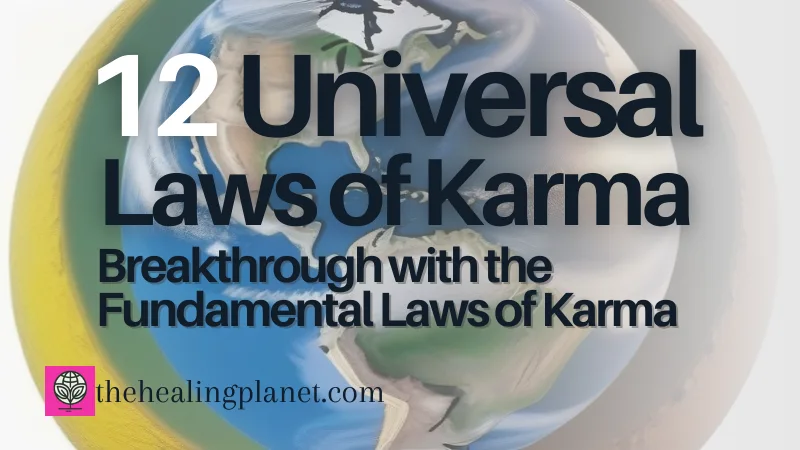Discover the true karma meaning and its impact on your life. Unlock the power of karma and learn to create positive change today.
What goes around comes around, or so they say. We’ve all heard of karma, that elusive force that seems to shape the events of our lives and determine our fate. But what exactly is karma? And where does it come from?
Unlocking Karma
Explore the Essence of Cause and Effect
Karma, originating from the Sanskrit word “karman” for action or deed, embodies a profound concept of cause and effect. It suggests that every action, whether positive or negative, inevitably yields consequences. This ancient principle finds its roots in Hinduism, Buddhism, Jainism, and other South Asian belief systems.
For centuries, Eastern philosophies have revered karma as fundamental. In Hinduism, actions shape not only the present but also future reincarnations. Similarly, Buddhists perceive karma as pivotal in the cycle of birth and rebirth (samsara), while Jain doctrine underscores the significance of individual intentions in shaping outcomes.
Curious to explore these intricate concepts further? Join us on a journey to unravel the layers surrounding karma. Discover its historical origins across diverse belief systems and gain fresh perspectives. Whether seeking personal enlightenment or intrigued by spiritual diversity, join us in uncovering why Karma matters more than ever before!
Principle of Cause and Effect: Karma’s Impact
How actions give rise to consequences
The core concept of karma revolves around the principle of cause and effect. In essence, it suggests that our actions are not isolated events but rather interconnected threads in a vast web of cause and effect. Every action we take, whether intentional or unintentional, has repercussions that ripple out into the world and eventually find their way back to us. This understanding forms the basis for the belief that our present experiences are influenced by our past actions and choices.
Across different belief systems, there is a shared recognition of this fundamental principle. For example, in Hinduism, karma is seen as an integral part of the cosmic order known as dharma. It emphasizes how one’s present circumstances are determined by their previous actions and states that every individual has a karmic debt to fulfill in each lifetime.
In Buddhism, karma plays a crucial role in understanding suffering and liberation from it. The Buddha taught that all beings are subject to the law of karma, where positive actions lead to positive outcomes and negative actions lead to suffering. However, unlike some other belief systems where karmic consequences may be eternal or everlasting in nature, Buddhism holds that through mindfulness and self-awareness one can break free from cyclic existence shaped by karma.
Understanding Karma in different belief systems
While there might be differences in interpretations across various beliefs about what constitutes an ideal action or how exactly karma unfolds its effects on individuals’ lives, common themes arise among them all – personal responsibility for behavior choices made at any moment.
In Hinduism’s perspective on Karma Yoga (the path focused on selfless service), engaging dutifully without attachment desires brings rewards – reflecting accumulated ‘good’ Karma eventuating prosperous future lifetimes while allowing spiritual growth opportunities now partially purifies present life’s sins stemming from selfish tendencies indulgence hindering cessation cycle birth-death-rebirth process according Moksha fate.
Buddhism also promotes personal responsibility through an understanding that intentional actions (karma-sankhara) shape one’s karmic outcomes. Buddhists believe that by cultivating wholesome intentions and practicing virtues, individuals can create positive karma, leading to favorable consequences not only in this life but also impacting future rebirths.
Thus, while the interpretations of karma may differ across belief systems, they all emphasize the interplay between actions and their consequences as a means to encourage ethical behavior and personal growth. Ultimately, understanding karma offers an insightful lens through which we can navigate our lives with greater compassion, mindfulness, and accountability for our choices.
Understanding Karma Across Religions
Hinduism deeply believes in karma, integral to the cosmic order. Karma, linked to rebirth and reincarnation, shapes one’s destiny. It stresses personal responsibility and dharma, leading to moksha.
Buddhism focuses on ending suffering by eliminating negative karma. Enlightenment and nirvana are the goals, offering liberation from cyclic existence.
Jainism ties karma to non-violence (ahimsa). Thoughts, words, and actions affect karma. Jain teachings advocate purity of thought to minimize harm.
Various beliefs interpret karma differently. Sikhism links karma to spiritual growth, Taoism aligns with natural processes, and New Age spirituality explores karma, past lives, and cosmic workings.
These interpretations influence practices like the Law of Attraction, Astrology, Magic, and Witchcraft, reflecting diverse perspectives on karma’s implications.
Collective Karma vs Individual Karma
In many belief systems, the concept of karma extends beyond individual actions and consequences to include collective karma. While individual karma refers to the idea that each person is responsible for their own thoughts, words, and deeds and will face corresponding outcomes in this life or future lives, collective karma recognizes the influence of community on individual experiences.
Within certain belief systems, such as Hinduism or Buddhism, collective karma takes into account the impact of ancestral lineage and group dynamics on an individual’s circumstances. This means that one’s current situation can be influenced by not only one’s own past actions but also those of their ancestors or even the larger society they are a part of.
The notion of collective karma reminds us that our lives are interconnected and deeply intertwined with those around us. It suggests that we bear some responsibility for not only our personal choices but also for shaping the environment in which others live. This broader perspective emphasizes how important it is to cultivate virtues like compassion and kindness towards others as these acts have repercussions not just for ourselves individually but also for the wellbeing of society as a whole. By acknowledging collective karma, individuals are encouraged to take greater ownership over their actions while recognizing their role within a larger social fabric.
Misconceptions about Karma
One common misconception about karma is the idea of instant justice. Many people believe that karma works like a cosmic force that immediately punishes wrongdoers and rewards good deeds. However, the reality is much more complex. Karma operates over multiple lifetimes, and its effects may not be seen immediately or in obvious ways. It’s important to understand that karma is not simply a system of reward and punishment but rather a concept rooted in cause and effect.
Another misconception involves viewing karma as a form of predestination. Some individuals believe that their actions are predetermined by their past actions or fate, leading to resignation or an abdication of personal responsibility. While one’s past actions can certainly influence future outcomes, the belief in predestination undermines the notion of free will, which many spiritual traditions emphasize alongside the principle of karma. Understanding this distinction allows individuals to take ownership for their choices while also recognizing the impact past actions may have on present circumstances.
In discussing misconceptions about karma, it is essential to dispel these oversimplifications and guide readers towards a deeper understanding of its complexities beyond notions of instant justice or fatalistic determinism. By clarifying these misunderstandings, we pave the way for exploring various interpretations of karma across different belief systems and acknowledging its profound significance in shaping individual beliefs and actions today.
Practical Application
The concept of karma extends beyond purely philosophical or religious discussions; it has practical implications for our everyday lives. One of the ways in which we can apply the principles of karma is by cultivating self-reflection and taking personal responsibility for our actions. By making an effort to become more aware of our thoughts, words, and behaviors, we can begin to understand how they may impact ourselves and others.
Self-reflection allows us to examine whether our actions align with our values and intentions. It prompts us to ask ourselves important questions like Am I treating others with kindness? or Am I living in integrity? When we take the time to reflect on these aspects, we develop a deeper understanding of the consequences that flow from them. Rather than attributing everything solely to external circumstances, practicing self-reflection enables us to recognize the role we play in shaping those outcomes.
With this recognition comes personal responsibility – acknowledging that our choices have repercussions and being willing to face those consequences without blaming others. By embracing personal accountability for both positive and negative outcomes, we empower ourselves to learn from past mistakes and make conscious efforts towards growth and improvement. Applying the principles of karma requires an active commitment from individuals who seek not only a moral life but also a transformative one through their own mindful actions.
Universal Teachings and Ethical Framework
Karma as a moral compass: Golden Rule and treating others with empathy.
Across various belief systems, the concept of karma serves as a powerful moral compass, guiding individuals to treat others with kindness, empathy, and respect. One key parallel can be seen in the Golden Rule – the principle of treating others as we would want to be treated ourselves. This ethical framework is found not only in Eastern religions such as Hinduism and Buddhism but also in major Western philosophies such as Christianity, Islam, and Judaism. The essence of karma lies in understanding that our actions have consequences not only for ourselves but also for those around us. By embodying empathy towards others and extending compassion to all beings, individuals can cultivate positive karma by inspiring love and harmony within their communities.
Similarities between karma and other ethical principles found in different belief systems.
While different cultures may use varying terminology or conceptual frameworks to discuss morality or ethics, many share common ideals with karma. For example, the teachings of Confucianism emphasize concepts like benevolence (ren) and maintaining harmonious relationships (li). These values align closely with the core principles underlying karmic beliefs despite differing cultural contexts. Similarly, Native American spirituality emphasizes living in harmony with nature and recognizing interconnectedness among all living beings – ideas which resonate strongly with the holistic perspective that forms one foundation block of karmic philosophy. By exploring these similarities between karma and diverse ethical principles across belief systems worldwide, we gain a deeper appreciation for how interconnected humanity truly is when it comes to sustaining universal values rooted in compassion, justice, and mindful action.
These findings shed light on how learners from diverse spiritual backgrounds can find common ground through acknowledging shared moral principles revolving around concepts like empathy-driven behavior or compassionate action—indicators marking an intellectual bridge toward fostering tolerance amidst increasing multicultural interactions today
Karma Meaning Conclusion
In summary, karma is a fundamental concept that holds significant meaning across a plethora of belief systems. The core idea revolves around the notion that our actions have consequences, whether in this lifetime or future ones. While the specifics and interpretations may vary, the underlying principle remains constant: we reap what we sow.
From ancient Eastern philosophies such as Hinduism and Buddhism to contemporary Western beliefs like New Age spirituality, karma transcends cultural boundaries and provides moral guidance for individuals navigating their paths in life. It serves as a moral compass that encourages personal responsibility and accountability for one’s actions.
By recognizing the impact of our thoughts, words, and deeds on ourselves and others, we can strive to create positive karmic cycles filled with compassion, kindness, and selflessness. Likewise, understanding karma empowers us to break negative patterns by consciously choosing more virtuous ways of being.
Overall, whether seen as a cosmic law or divine justice system, karma offers profound insights into human existence and serves as an ever-present reminder that our choices shape not only our own destinies but also contribute to the greater interconnected web of life itself.
Resouces
- Karma article on Encyclopedia Britannica: https://www.britannica.com/topic/karma Gives an overview of the concept of karma across Eastern religions and philosophies. Discusses origins, role of reincarnation, and breaking the cycle of karma.
- Core Themes of Karma article: 123helpme.com/essay/Seven-Karma-Themes Analyzes core themes underlying the concept of karma including intention, cause and effect, responsibility, interconnectedness, etc.









